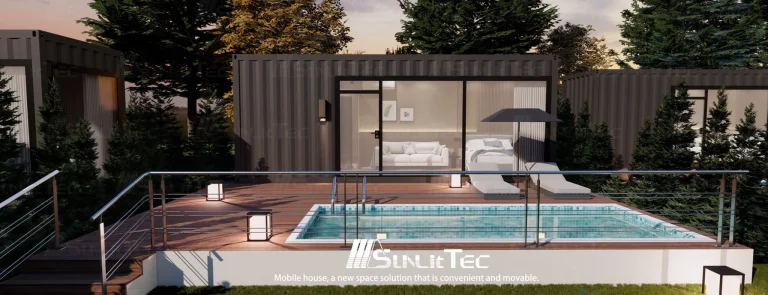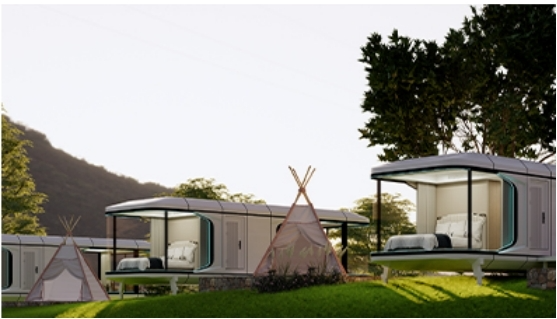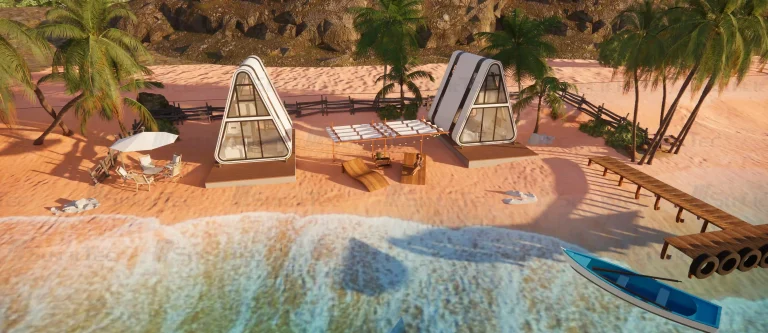Overview of Mobile Home Foundations
A mobile home foundation holds up your house. It keeps it flat and safe. Mobile homes need special foundations because they’re built differently. They can move. Knowing your choices helps you pick the best one for your home.
Importance of Choosing the Right Foundation
A good foundation makes your home last longer. It stays safe and keeps its value. A bad one can cause trouble, like cracks or tilting. This hurts your home. A solid foundation also follows local rules and saves energy. Our homes, like the TANK E1, need flat, hard ground. If the ground isn’t hard, we use concrete pillars or bolts.
Key Factors to Consider When Selecting a Foundation
Think about these things when picking a foundation:
-
Soil Kind: Sandy or clay soil changes how steady the foundation is.
-
Weather: Rainy or cold places need special foundations.
-
Money: Some foundations cost more than others.
-
Moving: Do you want to move your home later? We can add a trailer frame.
-
Rules: You must follow local building laws.
Mobile Home Foundations
There are a few foundation types for mobile homes. Each has its own good points. Let’s look at the main ones to help you choose.
Pier and Beam Foundations
Pier and beam foundations are common. They’re cheap and work well. Concrete piers or blocks go under the home’s frame. Steel straps or beams connect them.
Features and Benefits
-
Cheap: Costs less than slabs or basements.
-
Fixable: You can adjust piers if the home tilts.
-
Air Flow: The raised design stops dampness.
-
Good Fit: Great for bumpy land. For mountains, we use concrete pillars with bolts for our homes.
Installation Process
-
Get Ready: Clear the land. Make it flat and hard.
-
Set Piers: Put concrete piers under the home’s frame.
-
Add Beams: Attach steel or wood beams to piers.
-
Tie Down: Use bolts to lock the home to the foundation. This works for our OCEAN E3.
Concrete Slab Foundations
Concrete slabs are a big block of concrete poured on the ground. They’re strong and last a long time.
Advantages of Concrete Slabs
-
Tough: Doesn’t tilt or shift much.
-
Easy Care: Needs little fixing.
-
Saves Energy: Keeps your home warm or cool. Great for our green homes.
-
Custom Fit: Can go on soft ground with bolts for a tight hold.
Maintenance Requirements
-
Check for cracks every year. Weather can cause them.
-
Make sure water flows away from the slab.
-
Fix cracks fast to keep it strong.
Basement Foundations
Basements are rare for mobile homes. But they give extra room and strength.
Structural Benefits
-
More Space: Use it for storage or living.
-
Super Steady: Deep base stops tilting.
-
Safe: Protects from bad weather like floods.
Cost Implications
-
Expensive: Digging and building costs a lot.
-
Worth It: Adds value to your home.
-
Land Check: Needs good soil and follows local rules.
Regulations and Standards for Mobile Home Foundations
Following rules keeps your foundation safe and legal. You need to know these before building.
Local Building Codes and Permits
Every place has its own building rules. They say how deep or strong your foundation must be. Check with your local office for permits. Our homes need hard ground or concrete pillars. Make sure your plan fits the rules.
HUD Standards for Mobile Homes
The U.S. government (HUD) has rules for mobile homes. They include:
-
Strong Base: Must hold against wind or earthquakes.
-
Prep Land: Make the ground flat and hard.
-
Check It: Inspectors must say it’s safe.
Common Issues with Mobile Home Foundations
Even good foundations can have problems over time. Knowing them helps you fix things fast.
Settling and Shifting Problems
Settling happens when soil squishes down. The home tilts. Signs include:
-
Floors that aren’t flat. Doors that stick.
-
Cracks in walls or windows.
-
Fixes: Adjust pier and beam systems. Strengthen slabs.
Drainage Concerns
Bad drainage washes away soil. It weakens foundations. To stop this:
-
Add gutters to move water away.
-
Slope the ground away from the home.
-
Use gravel or drains to control water.
Sunlit Tec: Your Trusted Mobile Home Supplier
We’re Sunlit Tec. We love building awesome mobile homes. With 15 years in hardware and steel, we now make stylish, green homes like TANK and OCEAN models.
Why Choose Sunlit Tec?
-
Worldwide: People in the USA, Australia, and Germany love our homes.
-
Custom Made: We build homes your way, even with trailer frames.
-
Pro Team: Our experts make everything perfect.
-
Green Living: We use earth-friendly stuff and save energy.
Commitment to Quality and Customer Satisfaction
We always aim for top quality. Every home is built to make you happy. We help from start to finish, including foundation tips. Contact us to talk about your dream home.
Conclusion
Picking a foundation depends on your money, land, and plans. Pier and beam is cheap and flexible. Concrete slabs are tough. Basements add space. Follow rules, fix problems, and work with us at Sunlit Tec. Your home will stay strong for years.
Frequently Asked Questions (FAQs)
Q1 What is the most durable type of mobile home foundation?
A1 Concrete slabs are super tough. They don’t tilt much and need little care. They’re great for long-term homes. We use them with bolts on soft ground for our homes.
Q2 Are non-permanent foundations safe for long-term use?
A2 Yes, pier and beam foundations are safe if built right. Check them often. Fix any tilting. They work well with concrete pillars or trailer frames for our mobile homes.
Q3 How do I know if my mobile home foundation meets local regulations?
A3 Talk to your local building office. Get permits and follow their rules. Make sure it fits HUD standards, like strong bolts and flat ground. Our Sunlit Tec team can help you check.







